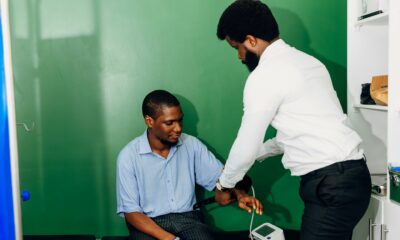Features
Tsema Ede-Okoye: The Untold Story of the Nigerian Primary Healthcare System
 It is a sunny Monday morning in one of the satellite towns of Abuja. There she is, a woman in the process of delivery, two nurses guiding her as her baby’s head crowns. Her childbirth process catches my interest because she is having her baby in a car, parked outside the clinic. She is lying down in the back seat with a rubber mackintosh spread under her to prevent the car seats from getting ruined. I guess she arrived at the clinic late, without giving the nurses time to prep her for delivery in the clinic’s delivery room. It was interesting to watch this woman have her baby in this unpleasant situation, with little or no amenities to ease the process of child birth.
It is a sunny Monday morning in one of the satellite towns of Abuja. There she is, a woman in the process of delivery, two nurses guiding her as her baby’s head crowns. Her childbirth process catches my interest because she is having her baby in a car, parked outside the clinic. She is lying down in the back seat with a rubber mackintosh spread under her to prevent the car seats from getting ruined. I guess she arrived at the clinic late, without giving the nurses time to prep her for delivery in the clinic’s delivery room. It was interesting to watch this woman have her baby in this unpleasant situation, with little or no amenities to ease the process of child birth.
Her story is that of many women in rural and semi-rural Nigerian communities, who are stuck in the rut of having risky deliveries due to Nigeria’s healthcare system. Daily, women who are in labour are referred to hospitals in the cities to have their babies because the clinics in their communities cannot handle complicated deliveries. At other times, women deliver their babies in unsanitary circumstances.
In many situations where babies are delivered in the Primary Health Centre, Nigeria’s infamously epileptic power supply means that the babies are delivered with light from cell phones, kerosene lamps, torches, or rechargeable lanterns.
In 2018, the World Health Organization ranked Nigeria’s healthcare system at 187 out of 190, Nigeria continues to produce some of the worst health outcomes in the world. We can no longer ignore the fact that Nigeria is mired in a healthcare crisis. WHO records that in 2016, the life expectancy in Nigeria was 55 years for men and 56 years for women. 100 out of 1000 children would probably die under five years, 372 out of 1000 men had the probability of dying between 15 and 60 years, and the number for women was 333 out of 1000. It is estimated that 1 in 13 women in Nigeria is likely to die during childbirth, and about 58,000 women died from childbirth-related complications in 2015. Even in situations where women safely have their babies, the clinics cannot provide the needed care for recovery because they lack basic amenities.
The unstable power supply situation continues to impact healthcare delivery in ways that have left Nigerians accustomed to substandard services. Minimum standards in healthcare delivery require the use of energy for running water, temperature control, lighting, ventilation, storage, and sundry clinical processes. Nigeria’s inability to provide constant electricity undermines the ability of facilities to guarantee these elementary functions. Unreliable electricity leads to vaccine spoilage, interruptions in the use of medical and diagnostic devices, and the lack of basic lighting for maternal delivery and emerging procedures.
The time for the government’s prioritisation of public health services is overdue, and addressing their energy needs will be an appropriate first step.
As Nigeria draws closer to 2030, it is worthy to note that the Nigerian Renewable Energy and Efficiency Policy (NREEP) commits Nigeria to achieve 20% of its National Electricity supplies from renewable energies by 2030. Efforts should be made to improve healthcare delivery through the application of renewable energy solutions, and this will possibly push Nigeria closer to achieving this goal in 2030. Focusing on providing solar solutions to energy and water scarcity in the health sector are potential quick wins for incoming legislative and executive office holders. With quality healthcare dependent on power for vaccines cold chain system, blood banking, child delivery, neonatal care, or complex surgeries, the important role electricity plays in healthcare delivery cannot be overstated. The epileptic power supply is a public health problem that Nigeria has allowed to linger.
While we advocate for solar-powered public health institutions, especially primary health centres, we are mindful of the poor maintenance culture that exists in the country. Inadequate funding and the lack of technical know-how contribute to the quick ruin and eventual abandonment of hospital equipment once minor faults develop. We see that manifest across the country with run-down infrastructure and facilities, and we need to have conversations with state authorities on the need to invest in training healthcare personnel on proper hospital equipment maintenance and repairs to help improve the delivery of health services. The government’s partnership with the Renewable Energy Association of Nigeria (REAN) will be useful in ensuring that contractors do not supply substandard Solar PV equipment, and provide technical support to public health institutions on solar power equipment maintenance.
While the rest of the world continues to take substantive steps forward in providing efficient healthcare, innovation is required in addressing the health and development challenges that present themselves in the 21st century. For Nigeria to catch up with other countries, we must be prepared to invest in health systems that can meet the diverse needs of the most vulnerable citizens at every age and stage of life.
I celebrate a group of heroes who are not acknowledged enough in Nigeria. Health personnel working in the public health system. They work tirelessly under the most deplorable conditions, with no equipment, and inadequate facilities. The financial incentives are insufficient for the work they do but they deliver their best to help people in need of medical attention. There are so many things broken in Nigeria’s healthcare system and I want to seize this moment to appreciate the doctors and nurses who deliver healthcare regardless of how faulty the system is. There is a lot of work to be done, and one can only hope that the new Minister of Health and the law makers identify the provision of renewable energy in Primary Health Centres as quick wins for healthcare delivery






















